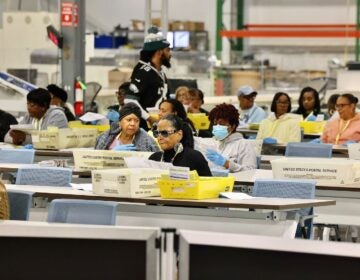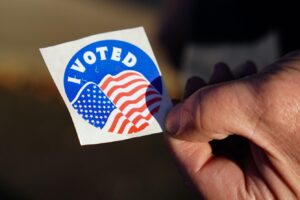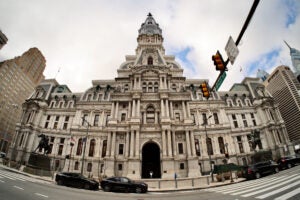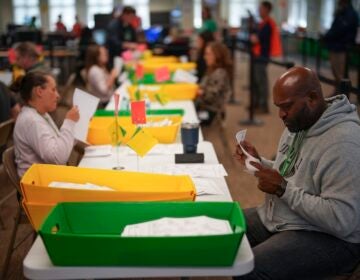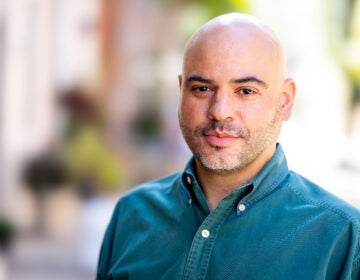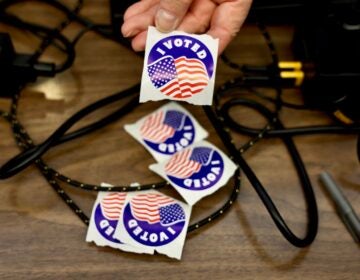Philly voter turnout rose to 34% this election — the highest in at least a decade. Here’s why
Off-year elections are typically sleepy. But this year’s cycle had more intrigue than usual.
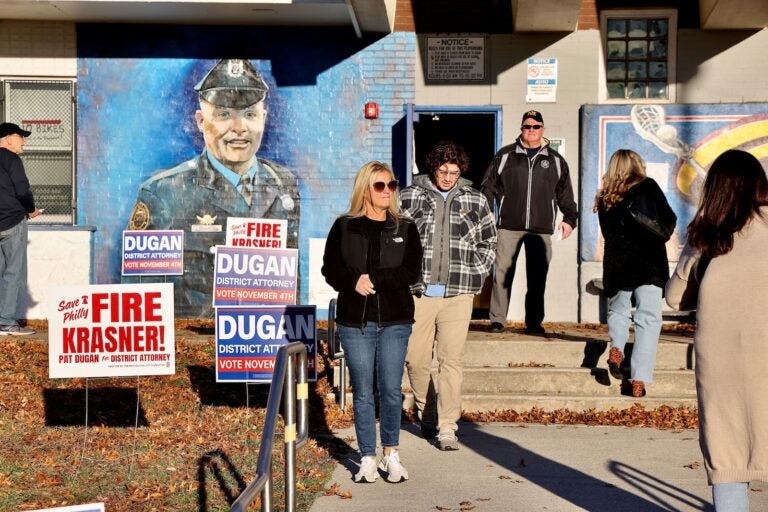
Voters come and go at the Corporal Jimmy O'Connor Memorial Recreation Center in North Philadelphia. (Emma Lee/WHYY)
Election 2025: Here’s what to know
- Race results: Here’s who won and who lost in Pennsylvania and New Jersey
- Prelude to 2026?: Democrats dominated as economic woes took a toll on Trump’s GOP. Here are some key takeaways
- Ballot questions: Here’s how Philly’s suburbs voted on open space and policing ballot measures
Voter turnout in Philadelphia was significantly higher in the 2025 general election — the first of President Donald Trump’s second term — than it was during the off-year contest in November 2021.
Roughly 34% of registered voters cast a ballot, according to unofficial results posted by the Office of the City Commissioners. That’s the highest percentage for an off-year election in at least a decade.
Four years ago, that figure was about 22%.
“I think what we’re seeing is this trend that all politics are national,” said Lauren Cristella, president and CEO of the Committee of Seventy.
What drove Philadelphia voters to the polls this year?
Off-year elections in Philadelphia are typically sleepy, with voter turnout generally hovering around 20%. This cycle’s ballot contained a bit more intrigue, however.
There was a well-funded campaign to unseat three Democratic justices on the Pennsylvania Supreme Court, all of whom were up for retention votes. But the fight, launched by right-wing activists aligned with Trump, was unsuccessful.
Justices Christine Donohue, Kevin Dougherty and David Wecht all easily held onto their posts, maintaining the court’s 5-2 Democratic majority. They’ll all serve another 10-year term.
And following May’s primary loss to Philadelphia District Attorney Larry Krasner, former Municipal Court Judge Patrick Dugan chose to run as a Republican in the general election. The registered Democrat made the decision after Krasner opponents made him the party’s nominee through a write-in campaign.
Krasner handily won Tuesday’s rematch, securing his third term as Philly’s top prosecutor.
Voters, who overwhelmingly cast their ballots in person, also elected Philadelphia’s next city controller and a slate of statewide and local judges.
Christopher Borick, director of the Muhlenberg College Institute of Public Opinion, said Wednesday that the state Supreme Court retention vote and the district attorney race likely contributed to higher turnout in Philadelphia.
He said Trump was also a factor.
“The broader cycle and reaction to Trump administration policies gave Democrats a reason to show up, an excitement, a chance to voice their frustration and engage. And then some of the Philadelphia-specific factors like the district attorney race and its connection to some progressive politics within the city,” said Borick.
Bob Brady, longtime chairman of the Philadelphia Democratic Party, agreed that the president played a role. But he also noted the quality of the candidates on the ballot.
“We did good. Real good,” said Brady. “We went out there and worked hard and our candidates worked hard.”
Part of a bigger trend
Tuesday’s election handed Democrats victories across the country, including in New Jersey and the suburbs of Philadelphia. What that may mean for next year’s midterm elections is unclear, especially considering the volatility and unpredictable nature that Trump has displayed during his second term in office.
Borick, with Muhlenberg College, said Democrats should be encouraged by Tuesday’s results, especially in Philadelphia.
“It’s a great sign for Democrats,” he said.In many ways, Philadelphia is the engine of Democratic success in Pennsylvania. When Democratic voters are engaged, I think it speaks well for the party’s chances.”
 This story is a part of Every Voice, Every Vote, a collaborative project managed by The Lenfest Institute for Journalism. The William Penn Foundation provides lead support for Every Voice, Every Vote in 2024 and 2025 with additional funding from The Lenfest Institute for Journalism, Comcast NBC Universal, The John S. and James L. Knight Foundation, Henry L. Kimelman Family Foundation, Judy and Peter Leone, Arctos Foundation, Wyncote Foundation, 25th Century Foundation, and Dolfinger-McMahon Foundation.
This story is a part of Every Voice, Every Vote, a collaborative project managed by The Lenfest Institute for Journalism. The William Penn Foundation provides lead support for Every Voice, Every Vote in 2024 and 2025 with additional funding from The Lenfest Institute for Journalism, Comcast NBC Universal, The John S. and James L. Knight Foundation, Henry L. Kimelman Family Foundation, Judy and Peter Leone, Arctos Foundation, Wyncote Foundation, 25th Century Foundation, and Dolfinger-McMahon Foundation.
To learn more about the project and view a full list of supporters, visit www.everyvoice-everyvote.org. Editorial content is created independently of the project’s donors.

Get daily updates from WHYY News!
WHYY is your source for fact-based, in-depth journalism and information. As a nonprofit organization, we rely on financial support from readers like you. Please give today.



